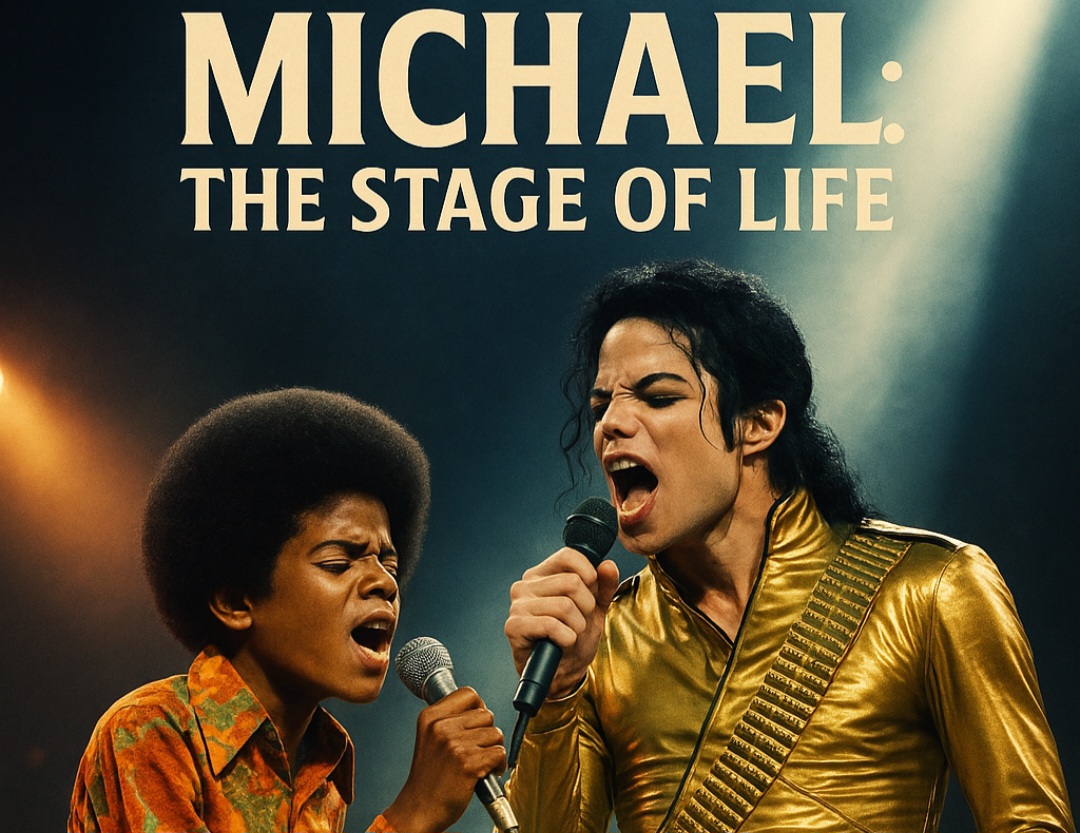
Michael: The Stage of Life” A Timeless Journey Through the Evolution of a Legend
In the newly released documentary “Michael: The Stage of Life,” audiences are invited on an emotional, electrifying journey through the remarkable evolution of Michael Jackson — from a prodigious child star to the global icon known as the King of Pop. The film captures not only the spectacle of his performances, but also the emotional depth and complexity of the man behind the music.
The poster alone speaks volumes. It depicts a powerful scene: young Michael, no older than 13, passionately singing with the fire of youth beside his older self, clad in his signature gold stage outfit, mic in hand, commanding the spotlight. The imagery embodies the very spirit of the film — a reflection on legacy, growth, and transformation.
Beginning with rare footage from his Jackson 5 days, the documentary shows a boy whose voice and presence lit up every stage he stepped on. Despite his young age, Michael’s command over his craft was undeniable. His brothers often described him as “the spark” of the group, a role he would carry with him into adulthood and beyond.
As the documentary transitions into his solo career, viewers witness a dramatic shift. The innocence of youth gives way to the precision of a perfectionist. Behind the sequins and moonwalks was an artist obsessed with excellence. The adult Michael is portrayed not as a mythical figure, but as a man burdened by expectations — his own and the world’s.
Directors masterfully weave together interviews, never-before-seen rehearsal footage, and personal diary entries, offering insight into the emotional weight Michael carried. Themes of isolation, fame, and the constant chase for creative reinvention are explored through his own words and those of close collaborators.
What sets this film apart is its refusal to flatten Michael into a caricature of his most famous moments. Yes, the glove, the spins, and the Thriller jacket are all present. But they are shown in context — milestones in a life filled with both artistic triumphs and personal trials. The documentary presents Michael as both monument and man.
Music is the heartbeat of the film. From the youthful joy of “I Want You Back” to the political pulse of “They Don’t Care About Us,” every performance shown reveals another layer of Michael’s voice — not just musically, but emotionally and socially. Each song is treated as a statement, a reflection of where he was in life and what he was trying to say to the world.
Visually, the documentary is stunning. Concert lighting, home video textures, and vibrant archival material are blended seamlessly to create a narrative that feels both grounded in history and dreamlike in scope. The editing mirrors the energy of a Michael Jackson show — fast, emotional, and unforgettable.
The inclusion of testimonials from dancers, producers, and lifelong fans adds richness to the narrative. Many speak of how Michael didn’t just change music — he changed people. His reach spanned continents, and his influence was both cultural and deeply personal.
One of the most poignant moments comes near the end, when footage of Michael rehearsing for his ill-fated This Is It tour is played alongside audio of a young Michael promising to “keep singing until the world listens.” The juxtaposition leaves audiences in awe of how fully that promise was kept.
Ultimately, “Michael: The Stage of Life” is not just a music documentary — it is a tribute to resilience, creativity, and the eternal impact of artistry. It invites fans and newcomers alike to witness not just the highs and lows of Michael’s career, but the humanity that powered every note.
By the end of the film, one thing becomes clear: Michael Jackson didn’t just perform on stages — he lived on them. And through this documentary, his story continues to echo, inspire, and dance across generations.
You may also like
Written by Fredrick Stephen
Archives
Calendar
| M | T | W | T | F | S | S |
|---|---|---|---|---|---|---|
| 1 | ||||||
| 2 | 3 | 4 | 5 | 6 | 7 | 8 |
| 9 | 10 | 11 | 12 | 13 | 14 | 15 |
| 16 | 17 | 18 | 19 | 20 | 21 | 22 |
| 23 | 24 | 25 | 26 | 27 | 28 | |